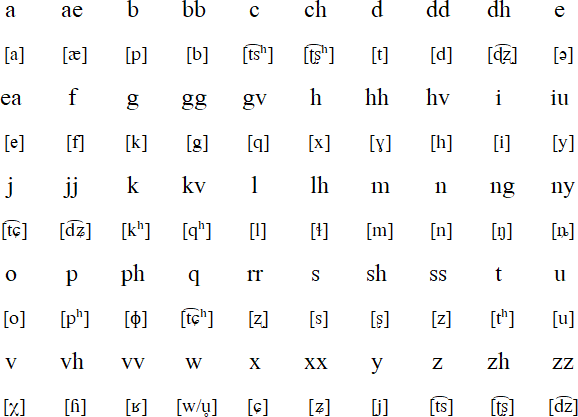Northern Qiang is a member of the Qiangic branch of the Sino-Tibetan language family. It is spoken in the north of Sichuan Province in the south west of China, particularly in Beichuan, Heishui, Mao, and Songpan counties. In 1999 there were about 57,800 speakers of Northern Qiang, most of whom were adults. Few children acquire the language at home.
Northern Qiang is also known as Ch'iang. There are five dialects, which are mutually intelligible: Mawo, Qugu, Weigu, Cimulin and Luhua. It is closely related to Southern Qiang, which is tonal, unlike Northern Qiang.
Northern Qiang can be written with the Latin alphabet using an orthography developed in the 1980s and based on the Qugu dialect. This became the official way to write Qiang in 1993. Relatively few speakers of Qiang are able to read and write their language, however most are literate in Chinese. A new script, known as the Qiang or Rma Script, was introduced in 2017.
Qiang is taught during the first few years of primary schools, and is used as a medium of instruction, alongside Mandarin, to some extent.

Download an alphabet chart for Northern Qiang (Excel)
Gver gverde ddubggrem gvuddu leage jumi legvei devgvuavu. Jumi degvei Vvapenzi rme. Bbobbo lea ddeabi de mimang shgvu legvi ddeabi le. Ddubggrem gvuddu deage mige Vvapenzi devgvuajia gvu she. Vvapenzi vvlo ravuerda guqu nyi rirgu.
Long long ago, there was a witch who stole a child. The child's name was Rapunzel. She grew into a beautiful woman. The witch was afraid someone would take Rapubzle. She locked Rapunzel in a tower.
Information about Northern Qiang
https://en.wikipedia.org/wiki/Qiang_language
https://fr.wikipedia.org/wiki/Qiang_(langue)
https://www.ethnologue.com/language/cng
http://www.endangeredlanguages.com/lang/2405
https://glottolog.org/resource/languoid/id/nort2722
Northern Qiang, Pumi, Southern Qiang, Tangut
Languages written with the Latin alphabet
Page created: 24.08.21. Last modified: 10.01.22
[top]
You can support this site by Buying Me A Coffee, and if you like what you see on this page, you can use the buttons below to share it with people you know.

If you like this site and find it useful, you can support it by making a donation via PayPal or Patreon, or by contributing in other ways. Omniglot is how I make my living.
Note: all links on this site to Amazon.com, Amazon.co.uk
and Amazon.fr
are affiliate links. This means I earn a commission if you click on any of them and buy something. So by clicking on these links you can help to support this site.
[top]